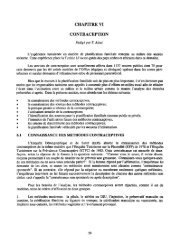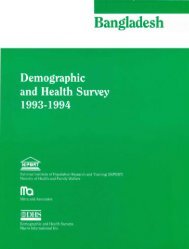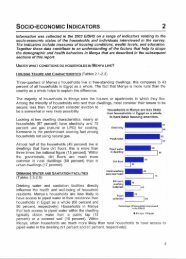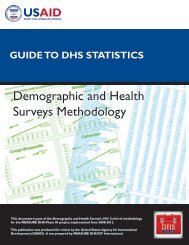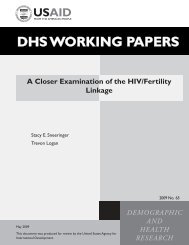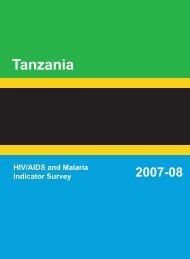- Page 1:
ZambiaDemographic andHealth Survey2
- Page 4 and 5:
This report summarises the findings
- Page 6:
Page3.6 Women’s Employment ......
- Page 9 and 10:
Page11.3.2 Micronutrient Intake amo
- Page 11 and 12:
PageA.7 Sample Selection ..........
- Page 13 and 14:
PageTable 3.11 Decision on use of e
- Page 15 and 16:
Table 7.7 Wanted fertility rates ..
- Page 17 and 18:
PageTable 13.5 Discussion of HIV/AI
- Page 19 and 20:
PREFACEThe Zambia Demographic and H
- Page 21 and 22:
FAMILY PLANNINGKnowledge of contrac
- Page 23 and 24: According to mothers’ reports, ar
- Page 25 and 26: ZAMBIALake TanganyikaLake MweruTanz
- Page 27 and 28: The 1980s marked the start of the f
- Page 29 and 30: the peripheral structures. An impor
- Page 31 and 32: ing in private households in the co
- Page 33 and 34: subjects agreed) received a referra
- Page 35 and 36: confidentiality.Finally, in additio
- Page 37 and 38: CHARACTERISTICS OF HOUSEHOLDS AND2R
- Page 39 and 40: Figure 2.2 Distribution of De Facto
- Page 41 and 42: 2.4 EDUCATIONAL LEVEL OF HOUSEHOLD
- Page 43 and 44: Figure 2.3 Percent Distribution of
- Page 45 and 46: Figure 2.4 Net and Gross Attendance
- Page 47 and 48: 2.5 HOUSING CHARACTERISTICS ANDHOUS
- Page 49 and 50: Thirty percent of households own a
- Page 51 and 52: CHARACTERISTICS OF RESPONDENTS3AND
- Page 53 and 54: enrolment ratios suggest that educa
- Page 55 and 56: 3.3 LITERACYThe ability to read is
- Page 57 and 58: Figure 3.1 Youth Literacy100 Percen
- Page 59 and 60: 3.5 MEN’S EMPLOYMENTMale responde
- Page 61 and 62: Table 3.6 Occupation: menPercent di
- Page 63 and 64: Table 3.8 Employment status: womenP
- Page 65 and 66: non-agricultural occupations, since
- Page 67 and 68: Table 3.12 Women’s control over e
- Page 69 and 70: Table 3.14.1 Women’s participatio
- Page 71 and 72: Table 3.14.2 Women’s participatio
- Page 73: Table 3.15.1 Women’s attitudes to
- Page 77 and 78: Table 3.16.2 Men’s attitudes towa
- Page 79 and 80: Table 3.17.1 Smoking of tobacco: wo
- Page 81 and 82: FERTILITY4Richard Banda and Margare
- Page 83 and 84: As the comparison in Figure 4.1 ind
- Page 85 and 86: Figure 4.3 Total Fertility Rate by
- Page 87 and 88: Table 4.4 Trends in fertility by ba
- Page 89 and 90: Results from the 2001-2002 ZDHS ind
- Page 91 and 92: The median birth interval is 33 mon
- Page 93 and 94: 4.6 TEENAGE FERTILITYAdolescent chi
- Page 95 and 96: FERTILITY REGULATION5Mika Bwembya a
- Page 97 and 98: Table 5.1.2 Knowledge of contracept
- Page 99 and 100: Seventy percent of currently marrie
- Page 101: Table 5.4 Current use of contracept
- Page 105 and 106: Table 5.7 Number of children at fir
- Page 107 and 108: Table 5.10 Source of contraceptionP
- Page 109 and 110: The pattern is slightly different f
- Page 111 and 112: 5.14 EXPOSURE TO FAMILY PLANNING ME
- Page 113 and 114: Table 5.16.1 Exposure to specific r
- Page 115 and 116: Table 5.17 shows that 18 percent of
- Page 117 and 118: Table 5.19 Attitudes of couples tow
- Page 119 and 120: Table 6.1 shows that one-fourth of
- Page 121 and 122: Table 6.3 Age at first marriagePerc
- Page 123 and 124: Table 6.5 Age at first sexual inter
- Page 125 and 126:
Table 6.7.1 Recent sexual activity:
- Page 127 and 128:
Almost four in ten (38 percent) of
- Page 129 and 130:
FERTILITY PREFERENCES AND UNMET NEE
- Page 131 and 132:
The above results show an increase
- Page 133 and 134:
7.3 UNMET NEED FOR FAMILY PLANNINGW
- Page 135 and 136:
Figure 7.4 Unmet Need for Spacing a
- Page 137 and 138:
The mean ideal number of children f
- Page 139 and 140:
Table 7.7 shows the total wanted fe
- Page 141 and 142:
Fifty-nine percent of all neonatal
- Page 143 and 144:
Table 8.3 Early childhood mortality
- Page 145 and 146:
Table 8.5 Early childhood mortality
- Page 147 and 148:
Only 27 percent of births are in a
- Page 149 and 150:
MATERNAL AND CHILD HEALTH9Miriam Ch
- Page 151 and 152:
Expectant mothers should beginanten
- Page 153 and 154:
There are particularly sharp differ
- Page 155 and 156:
Table 9.5 Place of deliveryPercent
- Page 157 and 158:
Table 9.7 shows that only 2 percent
- Page 159 and 160:
Table 9.8 Postnatal carePercent dis
- Page 161 and 162:
Table 9.9 Visits by health workersP
- Page 163 and 164:
Table 9.10.2 Neighbourhood Health C
- Page 165 and 166:
No major variations were observed w
- Page 167 and 168:
Table 9.13 Vaccinations by backgrou
- Page 169 and 170:
Table 9.14 Prevalence of injections
- Page 171 and 172:
Eastern province has the highest pr
- Page 173 and 174:
Table 9.18 Diarrhoea treatmentPerce
- Page 175 and 176:
Table 9.20 Household knowledge and
- Page 177 and 178:
10.1.1 Use of Bednets by Children a
- Page 179 and 180:
Table 10.4 Use of antimalarial drug
- Page 181 and 182:
Luapula province has the highest pe
- Page 183 and 184:
INFANT FEEDING, NUTRITIONAL PRACTIC
- Page 185 and 186:
than half (51 percent) of the infan
- Page 187 and 188:
tamination after cleaning, the nipp
- Page 189 and 190:
11.2 COMPLEMENTARY FEEDING11.2.1 Ty
- Page 191 and 192:
Few children under two years of age
- Page 193 and 194:
Table 11.6 Iodisation of household
- Page 195 and 196:
11.3.2 Micronutrient Intake among C
- Page 197 and 198:
11.3.3 Micronutrient Supplementatio
- Page 199 and 200:
11.4 HOUSEHOLD FOOD SECURITYFood se
- Page 201 and 202:
Table 11.12 Nutritional status of c
- Page 203 and 204:
Table 11.12 indicates that children
- Page 205 and 206:
VIOLENCE AGAINST WOMEN 12Mary Kazun
- Page 207 and 208:
Table 12.2 Experience of beatings o
- Page 209 and 210:
Results show that almost eight out
- Page 211 and 212:
Table 12.5 Experience of sexual vio
- Page 213 and 214:
More than four out of ten never-mar
- Page 215 and 216:
AIDS/HIV/STI-RELATED KNOWLEDGE AND1
- Page 217 and 218:
Table 13.2 Knowledge of ways to avo
- Page 219 and 220:
Knowledge of HIV prevention methods
- Page 221 and 222:
Table 13.5 Discussion of HIV/AIDS w
- Page 223 and 224:
The view that HIV status of a famil
- Page 225 and 226:
Table 13.8 Knowledge of “Trendset
- Page 227 and 228:
Figure 13.1 Unmet Need for HIV Test
- Page 229 and 230:
Table 13.10 Men's attitudes toward
- Page 231 and 232:
Men in sales and services and skill
- Page 233 and 234:
Table 13.13 Alcohol consumption by
- Page 235 and 236:
Table 13.14.2 Knowledge of symptoms
- Page 237 and 238:
The peak age for having STI symptom
- Page 239 and 240:
used condoms, 34 percent took medic
- Page 241 and 242:
The practice of having multiple par
- Page 243 and 244:
Table 13.21 Use of condoms by type
- Page 245 and 246:
PREVALENCE OF HIV AND SYPHILIS 14Ku
- Page 247 and 248:
14.1.2 Coverage for HIV Testing by
- Page 249 and 250:
14.1.3 Approach to Weighting Syphil
- Page 251 and 252:
14.2 SYPHILIS PREVALENCE RATES 1Tab
- Page 253 and 254:
Table 14.8 Syphilis prevalence by a
- Page 255 and 256:
The 2001-2002 ZDHS data can be used
- Page 257 and 258:
Figure 14.2 illustrates the distinc
- Page 259 and 260:
Figure 14.3 HIV Prevalence AmongWom
- Page 261 and 262:
ADULT MORTALITY15Ann A. WayData col
- Page 263 and 264:
Table 15.2 Adult mortality ratesDir
- Page 265 and 266:
While again not definitive, the res
- Page 267 and 268:
124 | ReferencesGaisie, K., A. Cros
- Page 269 and 270:
SAMPLE DESIGNAppendix AA.1 INTRODUC
- Page 271 and 272:
Table A.2. Expected number of selec
- Page 273 and 274:
Similarly, a total of 2,658 potenti
- Page 275 and 276:
Table A.5 Sample implementation: me
- Page 277 and 278:
where h represents the stratum whic
- Page 279 and 280:
Table B.2 Sampling errors for selec
- Page 281 and 282:
Table B.4 Sampling errors for selec
- Page 283 and 284:
Table B.6 Sampling errors for selec
- Page 285 and 286:
Table B.8 Sampling errors for selec
- Page 287 and 288:
Table B.10 Sampling errors for sele
- Page 289 and 290:
Table B.12 Sampling errors for sele
- Page 291 and 292:
DATA QUALITY TABLESAppendix CTable
- Page 293 and 294:
Table C.3 Completeness of reporting
- Page 295 and 296:
Table C.6 Reporting of age at death
- Page 297 and 298:
Provincial CoordinatorsMr Martin Nj
- Page 299 and 300:
Data Processing StaffMr Mathews Muv
- Page 301 and 302:
286 | Appendix E
- Page 303 and 304:
HOUSEHOLD SCHEDULENow we would like
- Page 305 and 306:
LINENO.USUAL RESIDENTSAND VISITORSR
- Page 307 and 308:
NO. QUESTIONS AND FILTERS CODING CA
- Page 309 and 310:
NO. QUESTIONS AND FILTERS CODING CA
- Page 311 and 312:
INFORMED CONSENT FOR SYPHILIS AND H
- Page 313 and 314:
September 28, 20012001 ZAMBIA DEMOG
- Page 315 and 316:
SECTION 1. RESPONDENT’S BACKGROUN
- Page 317 and 318:
SECTION 2: REPRODUCTIONNO. QUESTION
- Page 319 and 320:
212 213 214 215 216 217IF ALIVE:218
- Page 321 and 322:
NO QUESTIONS AND FILTERS CODING CAT
- Page 323 and 324:
NO. QUESTIONS AND FILTERS CODING CA
- Page 325 and 326:
NO. QUESTION AND FILTERS CODING CAT
- Page 327 and 328:
NO. QUESTION AND FILTERS CODING CAT
- Page 329 and 330:
407AWhere did the first antenatal v
- Page 331 and 332:
NAMELAST BIRTHNEXT-TO-LAST-BIRTHNAM
- Page 333 and 334:
NAMELAST BIRTHNEXT-TO-LAST-BIRTHNAM
- Page 335 and 336:
SECTION 4B. IMMUNIZATION, HEALTH AN
- Page 337 and 338:
LAST BIRTHNEXT-TO-LAST BIRTHNAMENAM
- Page 339 and 340:
LAST BIRTHNEXT-TO-LAST BIRTH474B CH
- Page 341 and 342:
LAST BIRTHNEXT-TO-LAST BIRTH480 Wha
- Page 343 and 344:
NO QUESTIONS AND FILTERS CODING CAT
- Page 345 and 346:
SECTION 5. MARRIAGE AND SEXUAL ACTI
- Page 347 and 348:
NO. QUESTIONS AND FILTERS CODING CA
- Page 349 and 350:
NO. QUESTIONS AND FILTERS CODING CA
- Page 351 and 352:
SECTION 6. FERTILITY PREFERENCESNO.
- Page 353 and 354:
NO. QUESTIONS AND FILTERS CODING CA
- Page 355 and 356:
NO. QUESTIONS AND FILTERS CODING CA
- Page 357 and 358:
SECTION 7. HUSBAND'S BACKGROUND AND
- Page 359 and 360:
NO. QUESTIONS AND FILTERS CODING CA
- Page 361 and 362:
NO. QUESTIONS AND FILTERS CODING CA
- Page 363 and 364:
NO. QUESTIONS AND FILTERS CODING CA
- Page 365 and 366:
NO. QUESTIONS AND FILTERS CODING CA
- Page 367 and 368:
SECTION 9. MATERNAL MORTALITYNO. QU
- Page 369 and 370:
904 What wasname given toyour oldes
- Page 371 and 372:
NAME OF EDITOR:____________________
- Page 373 and 374:
SUPERVISOR FIELD EDITOR OFFICE EDIT
- Page 375 and 376:
NO. QUESTIONS AND FILTERS CODING CA
- Page 377 and 378:
NO. QUESTIONS AND FILTERS CODING CA
- Page 379 and 380:
14 Have you heard of any other ways
- Page 381 and 382:
NO. QUESTIONS AND FILTERS CODING CA
- Page 383 and 384:
NO. QUESTIONS AND FILTERS CODING CA
- Page 385 and 386:
NO. QUESTIONS AND FILTERS CODING CA
- Page 387 and 388:
NO. QUESTIONS AND FILTERS CODING CA
- Page 389 and 390:
NO. QUESTIONS AND FILTERS CODING CA
- Page 391 and 392:
NO. QUESTIONS AND FILTERS CODING CA
- Page 393 and 394:
SECTION 5. FERTILITY PREFERENCESNO.
- Page 395 and 396:
NO. QUESTIONS AND FILTERS CODING CA
- Page 397 and 398:
SECTION 7. AIDS AND OTHER SEXUALLY
- Page 399 and 400:
NO. QUESTIONS AND FILTERS CODING CA
- Page 401 and 402:
NO. QUESTIONS AND FILTERS CODING CA



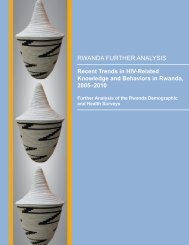

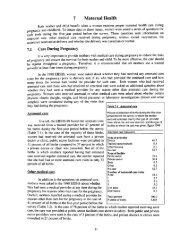


![Obtaining Informed Consent for HIV Testing [QRS4] - Measure DHS](https://img.yumpu.com/49850117/1/190x245/obtaining-informed-consent-for-hiv-testing-qrs4-measure-dhs.jpg?quality=85)

